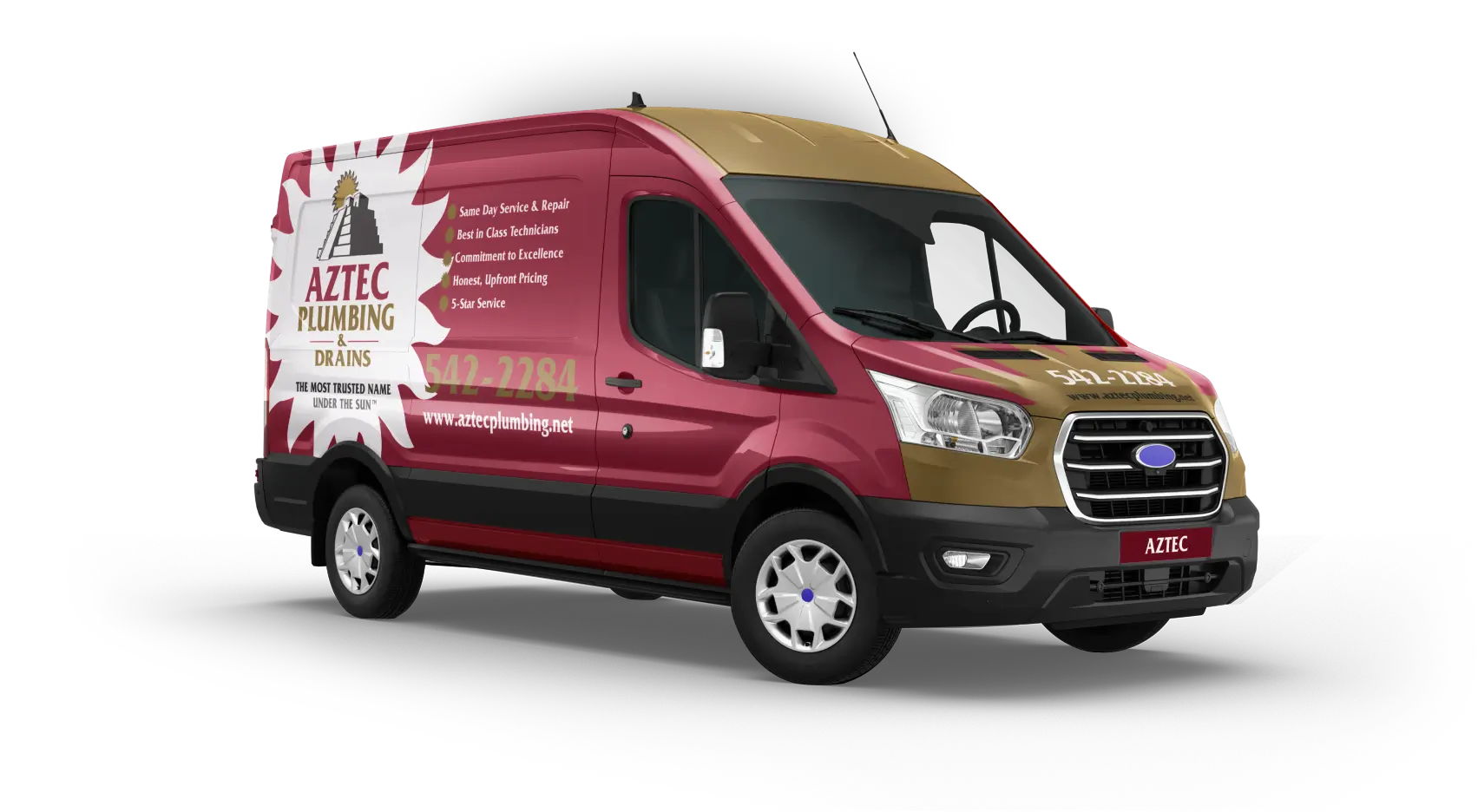A malfunctioning water heater burner can lead to inconsistent water temperatures, higher energy bills, and even safety risks. Whether it’s a pilot light failure, gas supply problem, or ignition malfunction, diagnosing the issue quickly can prevent further complications.
At Aztec Plumbing, we specialize in water heater diagnostics and repairs, helping Fort Myers homeowners resolve common burner issues caused by humidity, gas flow interruptions, and mineral buildup. Understanding the warning signs and acting early can keep your water heater running efficiently and extend its lifespan.
Common Signs of Water Heater Burner Malfunctions
Several warning signs indicate a burner problem that needs attention:
- Flickering or yellow flames instead of a steady blue flame suggest improper combustion.
- Unusual hissing or popping noises may indicate gas flow issues or sediment buildup.
- Inconsistent hot water or sudden temperature drops often result from an irregular burner function.
- Soot buildup around the burner can signal incomplete combustion or ventilation issues.
- Frequent burner shutdowns or failure to ignite could mean a gas supply or ignition control issue.
Pilot Light Failures: Causes and Solutions
A pilot light that won’t stay lit is one of the most common water heater burner problems. This issue can stem from a worn-out thermocouple that shuts off the gas supply, preventing the pilot light from staying lit. Gas supply interruptions, such as drafts, debris, or low gas pressure, can cause an unstable flame. Blockages in the pilot orifice from dirt and dust buildup can restrict gas flow.
Troubleshooting tip: Try relighting the pilot light following manufacturer instructions. If it won’t stay lit, test the thermocouple by holding the pilot knob down for 30 to 60 seconds. If the flame goes out when released, the thermocouple may need replacement.
Burner Ignition Problems: Electrical and Gas-Related Culprits
If the burner won’t ignite, the issue may be gas or electrical in nature. Faulty gas valves can restrict fuel flow, preventing ignition. Blocked gas lines caused by dirt or moisture can disrupt operation. Wiring issues or ignition control failures can impact electronic ignition models. Frequent power outages can cause electronic ignition systems to reset or fail.
If the issue persists, gas water heater troubleshooting should include checking gas pressure levels and ensuring proper electrical connections to the igniter.
Gas Supply Interruptions and Environmental Influences
Certain environmental factors can affect burner performance. Altitude changes can impact the air-to-gas ratio, requiring adjustments. Humidity-related condensation can cause gas line corrosion or pilot instability. Gas pressure fluctuations from municipal supply issues can lead to burner inconsistencies.
For accurate diagnosis, a manometer test can measure gas pressure and identify potential supply issues.
Thermocouple Malfunctions and Replacement Considerations
A failing thermocouple is one of the most common causes of burner issues. Symptoms include a pilot light that won’t stay lit even after relighting and a gas supply that is active, but the burner doesn’t ignite.
When replacing a thermocouple, consider OEM versus aftermarket parts since manufacturer-approved thermocouples ensure proper compatibility. The installation process involves turning off the gas, removing the faulty thermocouple, installing a new one, and testing the flame stability.
Blockages: Burner, Ventilation, and Flame Arrestor Issues
Blockages can disrupt the burner’s function and cause safety hazards. Debris or corrosion in burner ports can restrict gas flow. Ventilation issues can lead to excess carbon monoxide buildup. Flame arrestor blockages from lint or dust can trigger automatic shutoffs.
Regular cleaning of burner assemblies, vents, and air intake screens prevents these issues.
Maintenance Procedures to Prevent Burner Failures
Routine maintenance can help homeowners avoid costly repairs and extend the lifespan of their water heater. Key maintenance steps include annual burner inspections to check for misalignment, corrosion, or wear, cleaning the pilot assembly and nozzles to ensure unobstructed gas flow, checking air intake screens and flue pathways to prevent ventilation issues, and testing gas connections to ensure safe operation.
DIY Repairs vs. Professional Intervention
Some burner issues can be resolved at home, while others require a licensed professional.
DIY troubleshooting:
- Relighting a pilot light
- Cleaning minor burner blockages
- Resetting an electronic ignition system
Call a professional for:
- Gas leaks or suspected valve failures
- Persistent ignition or burner flame issues
- Electrical malfunctions in ignition control systems
- Any repair that may void manufacturer warranties or violate building codes
- Safety is critical. Using carbon monoxide detectors near gas appliances adds an extra layer of protection.
FAQs About Water Heater Burner Issues
Why is my water heater burner producing yellow flames?
A dirty burner or improper air-to-gas ratio can cause incomplete combustion.
Can a faulty thermocouple prevent my water heater from working?
Yes, a failing thermocouple can shut off the gas supply, preventing burner operation.
How often should I clean my burner assembly?
At least once a year to remove soot buildup and improve efficiency.
What causes a burner to make popping noises?
Sediment buildup in the tank can overheat water, causing aggressive boiling.
Can I replace my water heater burner myself?
For safety reasons, it’s best to have a professional handle burner replacement.
If your water heater burner isn’t working properly, don’t wait for the problem to escalate. Whether it’s an ignition failure, gas supply issue, or thermocouple malfunction, Aztec Plumbing’s experienced team is ready to help.
Call Aztec Plumbing today to schedule a burner inspection and restore reliable hot water to your home.
A water heater that won’t fill up can leave you with an unexpected cold shower and a frustrating plumbing issue. At Aztec Plumbing, we’ve been providing trusted water heater solutions in Fort Myers for years, tackling common issues like sediment buildup, faulty valves, and hard water blockages. Our expert plumbers diagnose and resolve these problems efficiently, ensuring your system operates at peak performance.
Common Causes of a Water Heater Not Filling
Several issues can prevent a water heater from filling properly, ranging from minor blockages to more serious component failures. Some of the most common causes include:
- Closed or partially closed water supply valve: Water may be restricted from entering the tank.
- Faulty temperature and pressure relief (T&P) valve: A malfunctioning valve can block water flow.
- Sediment buildup: Minerals inside the tank clog internal components, reducing water flow.
- Airlocks in the plumbing system: Trapped air prevents proper water distribution.
- Leaking or cracked dip tube: This misdirects incoming water, affecting how the tank fills.
- Clogged inlet screen or filter: Debris can accumulate and restrict water intake.
- Frozen pipes: Though uncommon in Florida, frozen pipes can stop water from reaching the tank.
- Hard water deposits: Mineral buildup accelerates blockages, reducing system efficiency.
How to Troubleshoot Water Heater Filling Issues
If your water heater isn’t filling properly, here are a few key steps to help diagnose the issue:
- Check the water supply valves: Ensure the main water supply and the heater’s shut-off valve are fully open.
- Test home water pressure: Use a pressure gauge on an outdoor hose bib to see if low pressure is affecting your plumbing system.
- Inspect the inlet screen: Mineral deposits or debris could be blocking water intake.
- Listen for unusual sounds: Knocking or gurgling noises may indicate trapped air.
- Check other fixtures: If multiple faucets have low pressure, the issue may not be isolated to the water heater.
- Know your system type: Tank water heaters often experience sediment buildup, while tankless models may suffer from inlet filter clogs or gas flow issues.
Fixing a Water Heater That Won’t Fill
Once the issue is identified, there are several ways to restore proper function:
- Open all water supply valves to ensure proper water flow.
- Clear airlocks by running multiple hot water taps or using a hose bib to release trapped air.
- Flush the tank to remove sediment that may be causing blockages.
- Thaw frozen pipes carefully with a heating pad or hairdryer if needed.
- Clean clogged inlet screens using vinegar or a soft brush.
- Replace a faulty T&P valve to allow water to enter the tank properly.
- Install a water softener to prevent mineral buildup from hard water.
Safety Precautions Before DIY Repairs
Before attempting any repairs, follow these essential safety precautions:
- Turn off the gas or electricity to the heater before working on the unit.
- Relieve tank pressure using the T&P valve before draining.
- Avoid direct contact with hot water or steam to prevent burns.
- Use insulated gloves and goggles when handling gas components or electrical connections.
When to Call a Professional Plumber
While some water heater issues can be fixed with simple DIY solutions, others require professional attention. Consider calling a plumber if you experience:
- Major leaks or visible damage to the tank.
- Persistent airlocks or valve malfunctions that don’t resolve.
- Complex repairs such as dip tube or pressure regulator replacements.
- Concerns about voiding the manufacturer’s warranty with DIY repairs. Suspected hidden leaks in the plumbing system.
A professional plumber can diagnose and fix issues quickly, preventing further damage and ensuring the longevity of your water heater.
Preventing Future Water Heater Issues
Regular maintenance helps homeowners avoid common water heater problems and keep their system running efficiently. Consider these preventative measures:
- Flush the tank annually to remove sediment buildup.
- Inspect shut-off valves, inlet screens, and plumbing connections at least once a year.
- Test home water pressure regularly to ensure it stays within the recommended range.
- Install a water softener or use descaling treatments to reduce mineral buildup.
- Insulate exposed pipes in colder climates to prevent freezing.
- By keeping up with routine maintenance, you can improve your water heater’s efficiency and reduce the risk of unexpected breakdowns.
FAQs About Water Heater Filling Problems
How do I test my home’s water pressure?
Attach a pressure gauge to an outdoor hose bib to measure pressure levels. If readings are low, there may be a broader plumbing issue.
Can a clogged inlet screen stop my water heater from filling?
Yes, mineral buildup or debris can block water intake. Cleaning or replacing the screen may restore normal function.
Why is my water heater filling slowly?
Possible causes include sediment buildup, low home water pressure, or a partially closed shut-off valve.
Does hard water contribute to water heater problems?
Yes, minerals in hard water accelerate sediment accumulation. Regular flushing and water softeners can help prevent buildup.
Can DIY repair my water heater warranty?
It depends on the manufacturer. Always check warranty terms before attempting repairs.
How long does it take to get hot water after fixing a filling issue?
Depending on the tank size, it may take one to two hours for hot water to return.
Schedule Your Water Heater Service Today
If your water heater isn’t filling properly, don’t wait for the problem to get worse. Whether it’s a simple fix or a sign of a bigger issue, Aztec Plumbing’s expert team is here to help. Our experienced plumbers provide fast, reliable water heater diagnostics and repairs, ensuring you have a steady supply of hot water when you need it most.
Call Aztec Plumbing today to schedule your water heater service and get your system back in top condition!
Are your energy bills unexpectedly high? Your water heater might be the culprit. As one of the largest energy consumers in your home, an inefficient or poorly maintained water heater can drive up costs. Understanding the causes behind excessive energy use and exploring practical solutions can help you save money and improve efficiency before reaching out to the water heater repair experts at Aztec Plumbing & Drains.
Types of Water Heaters and Their Energy Efficiency
The type of water heater in your home plays a significant role in energy consumption. Here are the four main types and how they compare in terms of efficiency:
1. Tank-style water heaters:
- Traditional and most commonly used.
- Can be less efficient due to standby heat loss (energy wasted keeping stored water warm).
- Available in gas, electric, and oil-fired models.
2. Tankless water heaters:
- Heat water on demand, eliminating standby heat loss.
- Can reduce energy consumption by 24-34% in homes that use 41 gallons or less of hot water daily.
3. Heat pump water heaters:
- The most energy-efficient electric option.
- Use heat from the air or ground, making them 2-3 times more efficient than traditional electric resistance models.
4. Solar water heaters:
- Highly efficient in sunny climates.
- Can reduce water heating bills by 50-80%.
Factors Contributing to High Energy Bills
If your water heater is causing high energy bills, several factors might be at play:
1. Inefficient Systems:
- Older models (10+ years) often lack modern efficiency standards.
- Electric resistance heaters are generally less efficient than gas options.
- Units without ENERGY STAR certification may use more energy.
2. Temperature Settings:
- Default temperatures (130-140°F) are often higher than necessary.
- Reducing the temperature to 120°F can save 3-5% in heating costs for every 10°F adjustment.
3. Insulation Issues:
- Poor tank insulation increases standby heat loss.
- Uninsulated pipes lose heat quickly, further straining the system.
- Adding an insulating blanket to your water heater can reduce heat loss by up to 45%.
4. Sediment Buildup:
- Hard water leads to mineral deposits that reduce efficiency.
- Annual flushing can prevent this problem and improve performance.
5. Leaks and Drips:
- Even small leaks waste energy and water.
- A single leaking hot water faucet can waste over 200 gallons per month.
6. Frequent Reheating (Tank-style Heaters):
- Constant reheating of stored water consumes energy.
- Using a timer to heat water only when needed can reduce costs.
7. Size Mismatch:
- Oversized units waste energy heating unused water.
- Undersized units work harder to meet demand, leading to inefficiency.
8. Water Usage Habits:
- Long showers and running hot water unnecessarily increase energy use.
- Switching to cold water for certain tasks, like laundry, can help.
9. Environmental Factors:
- Colder climates require more energy to maintain water temperature.
- Placement in unheated areas (like garages) increases energy needs.
10. Maintenance Issues:
- Lack of maintenance reduces efficiency over time.
- Faulty thermostats or heating elements can lead to overconsumption.
Solutions and Improvements
If you’re dealing with high energy bills from your water heater, consider these solutions:
- Upgrade to an efficient model: Choose ENERGY STAR-certified units for long-term savings.
- Insulate the tank and pipes: Reduce heat loss and improve efficiency.
- Lower the temperature setting: A setting of 120°F is sufficient for most households.
- Install low-flow fixtures: Reduce hot water usage in showers and sinks.
- Use cold water for laundry: This simple change significantly lowers energy costs.
- Fix leaks promptly: Prevent wasted energy and water.
- Implement a maintenance schedule: Regular flushing and inspections keep your system running efficiently.
- Consider a tankless or heat pump model: For significant energy savings, invest in modern technology.
- Optimize heating schedules: Use timers or smart controls to heat water only when needed.
- Explore solar options: If your climate is suitable, solar heating can drastically cut costs.
A well-maintained and efficient water heater is key to keeping energy bills manageable. By identifying inefficiencies and making strategic upgrades, you can enjoy hot water without breaking the bank. Take control of your energy costs today with these practical solutions.
When your water heater stops producing hot water, it can be frustrating and inconvenient. Before you call for professional water heater help, identifying the problem is essential. This guide outlines six common causes of a water heater not heating and provides actionable solutions to get your system running again.
1. Electric Water Heater Circuit Breaker Keeps Tripping
How to locate your water heater's circuit breaker: The circuit breaker for your water heater is typically in the main electrical panel. It should be labeled clearly, making it easy to find.
Common reasons for repeated tripping:
- Overloaded circuits or improper wiring
- A faulty heating element drawing too much current
- Issues with the thermostat or control board
Safe reset procedures: Turn off the breaker completely before resetting it. If it trips again immediately, avoid repeated resets and consult a professional to avoid electrical hazards.
2. Gas Water Heater Pilot Light Keeps Going Out
Steps to check gas supply issues: Ensure the gas valve is fully open and inspect for any kinks in the supply line. If there’s no smell of gas, it may indicate a supply interruption.
How to safely relight the pilot: Follow the manufacturer's instructions, which often involve holding the pilot button and using a match or lighter.
Common causes of pilot light failure:
- Dirty or clogged pilot orifice
- Faulty thermocouple
- Drafts extinguishing the flame
Testing the thermocouple: Use a multimeter to check if the thermocouple generates voltage when heated. If not, replace it with a compatible part.
3. Water Heater Thermostat Not Working Properly
Signs of thermostat failure:
- Water temperature fluctuations
- No hot water despite the heater running
- A continuously running water heater
Testing thermostat functionality: Turn off power, remove the access panel, and use a multimeter to check for continuity.
Step-by-step replacement guide:
- Shut off power or gas supply.
- Remove the access cover and disconnect the thermostat wires.
- Replace the faulty thermostat with a compatible model.
- Reconnect wires and restore power.
Proper temperature settings: Set the thermostat to 120°F to 140°F for optimal performance and safety.
4. How to Flush Water Heater Sediment
Signs of sediment buildup:
- Rumbling or popping noises from the tank
- Reduced water heating efficiency
- Discolored or cloudy water
Step-by-step flushing procedure:
- Turn off power or gas to the heater.
- Attach a garden hose to the drain valve and direct it to a safe drainage area.
- Open the valve and allow water to flow until clear.
- Close the valve and refill the tank.
Maintenance schedule recommendations: Flush your water heater every six to twelve months to minimize sediment buildup.
Impact of water hardness on sediment buildup:installation of a water softener.
5. Water Heater Size Problems and Solutions
How to calculate proper water heater size: Determine your household's peak hour demand by calculating water usage for showers, appliances, and faucets.
Signs of an undersized unit:
- Running out of hot water quickly
- Long recovery times between uses
Peak hour demand calculation: Add the total gallons needed during the busiest hour of the day. Match this figure to the water heater's first-hour rating.
Temporary solutions for capacity issues:
- Limit simultaneous water use
- Install a point-of-use water heater for high-demand areas
6. Water Heater Leaking
Identifying the source of leaks: Inspect the tank, valves, and connections for visible drips or pooling water.
Common causes of tank leaks:
- Corrosion inside the tank
- Loose or damaged connections
- A faulty pressure relief valve
When leaks affect heating performance: Leaking water can disrupt heating efficiency and lead to system failure if not addressed promptly.
Temporary fixes vs. replacement needs: Seal small leaks with epoxy as a temporary fix. If the tank itself is compromised, replacement is often the only option.
water heater requires a simple fix or professional attention, understanding the root cause helps you take the right steps. Don’t let cold water disrupt your day—address the issue confidently and effectively.
Are you tired of running out of hot water in the middle of a shower? Do you want to save money on your energy bills? If so, consider going tankless. But before you make the switch, it's important to weigh the pros and cons of tankless water heaters.
Pros Of Installing a Tankless Water Heater
Endless Hot Water
With a tankless water heater, you never have to worry about running out of hot water.
Tankless water heaters heat water on demand, which means you'll never run out of hot water again as it provides a continuous supply of hot water, making it ideal for large households or homes with high hot water demands.
Energy Savings
Tankless water heaters are known for their energy efficiency. Unlike traditional water heaters that constantly heat and store water, tankless water heaters only heat water as it is needed. This means you can save on your energy bills by not heating water when it’s not in use.
Space-Saving
Tankless water heaters are much smaller than traditional tank heaters. They are compact and wall-mounted and can be installed in a closet or on a wall, freeing up valuable floor space in your home. If you have a small utility room or limited space, a tankless water heater can be a great solution.
Longer Lifespan
Tankless water heaters can last up to 20 years, which is much longer than traditional tank heaters.
Cons Of Installing A Tankless Water Heater
Higher Upfront Cost
Tankless water heaters typically have a higher upfront cost compared to traditional water heaters. However, long-term energy savings can offset this initial investment, so you'll need to weigh the upfront cost against the long-term savings.
Limited Flow Rate
While tankless water heaters can provide endless hot water, they have a limited flow rate. This means that if you have multiple hot water outlets running simultaneously, the water pressure may decrease. It’s important to consider your household’s hot water needs before opting for a tankless water heater.
Complicated Installation
Tankless water heaters require a professional installation, which can be more complicated and expensive than installing a traditional tank heater.
Regular Maintenance
Tankless water heaters require regular maintenance to ensure optimal performance. This includes descaling the unit to remove mineral buildup and checking for any potential issues. It’s recommended to schedule annual maintenance with a professional plumber to keep your tankless water heater in top shape.
So, is a tankless water heater right for you? It depends on your needs and budget. A tankless water heater may be a good option if you have a small household and want to save money on your energy bills. But a traditional tank heater may be a better choice if you have a large family or limited space.
At Aztec Plumbing & Drains, we specialize in tankless water heater installation and maintenance. Contact us today to learn more about our services and how we can help you save money and enjoy endless hot water. (239) 932-2959
Learn More in Our Water Heater Series:
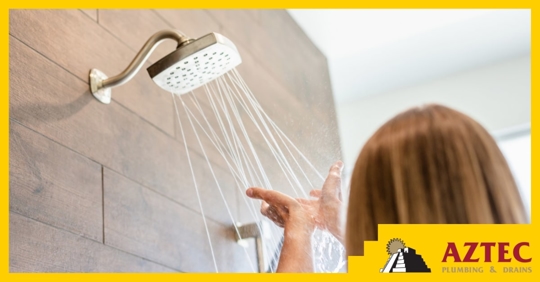
Why Hot Water Takes Forever
If you're like most homeowners, you expect hot water to be available as soon as you turn on the shower or faucet. But sometimes, that's not the case - you may have to wait what seems like an eternity for hot water to arrive. So what's going on? How long is normal to wait for hot water? Why is your hot water taking so long?
Keep reading to learn more about some common reasons why hot water may be delayed and possible solutions.
How Hot Water is Delivered
If you've ever wondered why it takes so long for hot water to reach your shower or sink, plumbing is to blame. Your home's plumbing is a system of pipes that carries water from the municipal or well water supply to your fixtures and appliances. Depending on the size of your home and the number of fixtures, this system can be quite extensive.
Water heaters are usually located near the plumbing's point of entry into the home. Using either gas or electricity to heat water, the water heater sends hot water through the plumbing system to reach all of your fixtures.
If you have a lot of plumbing in your home or your water heater is located far from your fixtures, the hot water can take a while to reach you. This situation isn't necessarily a problem but could be an inconvenience worth addressing. There are, however, certain problems that do warrant attention from you and a professional plumber.
Water Heater Problems
If the water heater isn't providing enough hot water, it can cause a noticeable delay in the flow of hot water. This is because the water has to travel through more pipes to reach your taps, which can cool the water down somewhat.
If you have an old or inefficient water heater, it may not be able to heat the water quickly enough to keep up with demand. This can be frustrating, especially if you're trying to take a shower and the water is suddenly cold.
If your water heater is making strange noises, this could be a sign that it's not working properly. You may hear banging, gurgling, or popping sounds from the unit. These noises can indicate sediment buildup in the tank, which can interfere with the heating process and cause the water to become lukewarm.
If you're having any of these problems, you can do a few things. First, try turning up the thermostat on your water heater. This will make the water heater work harder, but it may be enough to solve the problem. If that doesn't help, you may need to replace your water heater with a newer, more powerful model. In any case, the best way to solve water heater problems is to have your water heater serviced by a qualified technician.
Whatever you do, don't try to increase the water pressure in your home, as this can damage your pipes and make the problem worse.
Solution: Recirculation Pump
A recirculation pump is a device that helps circulate water through your plumbing system. Doing this can help ensure hot water is delivered more quickly to your fixtures and appliances. Recirculation pumps are typically installed under your sink, and they have a small water line that runs to your water heater.
If you're interested in installing a recirculation pump in your home, talk to your plumber about it. They can help you determine if this is the right solution and install it properly.
Keeping Your Water Hot and Plumbing Efficient
If you're experiencing long waits for hot water, give the Aztec Plumbing & Drains team a call today at (239) 932-2959. We'll help you troubleshoot the problem and get your hot water back on track in no time.
Learn More in Our Water Heater Series:
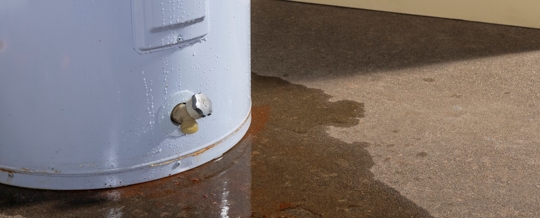
Hard water, which tends to leave behind calcium and magnesium deposits, is a common issue for many homeowners. While these mineral deposits aren’t a danger to your family’s health, they can damage appliances, your water heater in particular.
Here’s What Hard Water Does to Your Water Heater
Decreased water heater efficiency & shorter lifespan: Over time, hard water can reduce a water heater’s efficiency. As sediment builds up on the heating elements, your water will take longer to warm up when showering and laundering. This is more than just an inconvenience. Because your water heater is forced to work harder, it’s more prone to increased wear and tear. You may have to replace your unit much sooner than expected. Remember, an inefficient water heater can also cause your monthly utility bills to rise substantially.
Must flush your water heater more often: To minimize sediment, experts recommend having your water heater flushed at least once a year. However, units that are regularly exposed to hard water need more frequent flushing. In some instances, you’ll need to drain and flush the tank every three months. If you happen to hear a popping or rattling noise, this is a telltale sign an excessive amount of sediment has settled at the bottom of the tank.
How to Overcome Hard Water
Adjust your water heater’s thermostat:High water temperatures can increase the amount of scale buildup in your unit. Lowering your water heater’s thermostat can help. The ideal temperature setting is about 120 degrees.
Invest in a water softener: There are a few different ways to resolve hard water issues. However, the best approach is to invest in a water softener. Most of these systems work by adding sodium ions, which naturally remove calcium and magnesium from hard water. All of your water-using appliances will have an extra level of protection against mineral deposits, including the water heater. You stand to save a lot of extra money in the long run.
Count on the Cape Coral Plumbers for a Quality Repair
Whether you need to repair or replace your water heater or install a water treatment system, the skilled and experienced plumbers at Aztec Plumbing & Drains are prepared to help! We even back our work with a 1-year parts-and-labor warranty. Call (239) 932-2959 or contact us here to schedule your appointment.
Check Out Our Blog Series on Water Heaters
- Water Heater 101
- My Water Heater Running Out of Water Fast
- My Water Heater is Making Noises
- Why Does My Water Heater Smell Like Rotten Eggs
- How Does Hard Water Affect My Water Heater
- How Long Is Normal to Wait for Hot Water?
- Why Won't My Water Heater Drain?
- How to Tell Water Heater Age?
- How to Maintain a Water Heater?
- How Often Should I Flush My Water Heater?
- DIY Water Heater Maintenance
- The Pros and Cons of Tankless Heaters
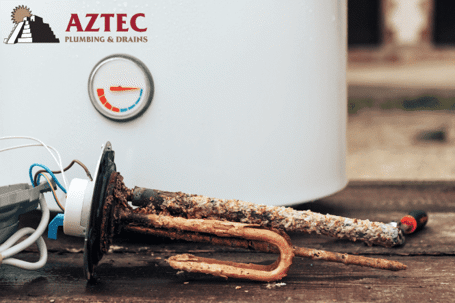
Water heater making noise that is driving you crazy? We know the feeling. Not only can loud banging or knocking sounds cause you to wake up abruptly during the middle of the night, they can simply disturb the peace and quiet at any time of the day. Luckily, not all of these sounds indicate that you need to repair your water heater. Here are a few common noises your water heater might make and what those sounds often mean:
Popping, Tapping or Knocking Sounds
These are the most common noises a water heater makes and luckily, it’s usually a simple fix. These noises indicate there is a buildup of sediment, or mineral deposits in the tank and it needs to be flushed out. Even if you’re not hearing these noises just yet, we recommend flushing your water heater once a year to prevent a buildup of deposits and avoid more troublesome problems down the road.
A popping sound coming from your water heater is a clear red flag. This noise typically indicates an excessive amount of sediment at the bottom of the tank. It’ll eventually become more difficult for your unit to transfer heat. You should also consider installing a water filtration system (learn about how much a whole-house water filter costs here), which helps remove hard minerals.
Humming or Buzzing
If you have an electric water heater and notice a humming or buzzing sound, it usually means water is flowing around the heating element. When this happens, it can cause vibrations which create the noises you’re hearing. Most of the time, a slight tightening of the element will fix the problem and get rid of the noise.
Screeching
This is usually one of the more alarming sounds your water heater can make and for good reason. Screeching sounds are never good and usually indicate that water flow is restricted or that there’s a serious problem with a part or component.
While it may just be a partially closed inlet control valve that needs to be adjusted, these noises shouldn’t be taken lightly. Opening the inlet control valve is as simple as turning a knob. If the valve seems stuck, debris may have gotten stuck inside. Still, it’s always best to call in a professional right away.
Cape Coral Water Heater Service & Repairs
When you hire Aztec Plumbing & Drains, we will give you honest and professional advice. We'll tell you about the pros and cons of repairing vs. replacing your water heater. If we do recommend a replacement, we will explain all of your options to you fully in simple language. Call us today at (239) 932-2959.
Learn More in Our Water Heater Series:
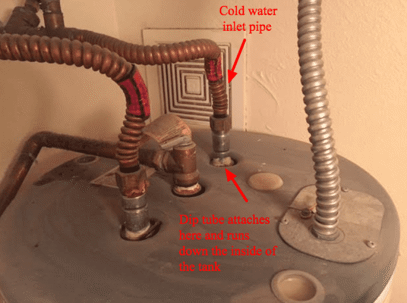
Take a second to think about what your life would be like without hot water. That’s right — cold showers and baths, cold water for washing dishes and kitchen utensils, cold water for laundry. It would make things far less convenient and a heck of a lot less comfortable, right? Well, it’s time to give some appreciation to your water heater — the one piece of equipment you can thank for having hot water when and where you need it.
What is a Water Heater?
A water heater is a piece of plumbing equipment responsible for a heat transfer process that uses an energy source to heat water above its “normal” temperature. Since we’re not blessed with an adequate amount of hot springs, we typically don’t have access to “natural” hot water in the United States.
For that reason, comes the need for water heaters. These appliances provide us with a continual supply of hot water — so we can use it when and where we need it, whether it’s in the kitchen or in the bathroom.
Water Heater Power Sources
Most water heating appliances require fossil fuels for operation. Natural gas, propane, oil or solid fuels generally act as the fuel source for these appliances, but electricity can be used as well.
Additionally, alternative energy sources such as solar energy, heat pumps and geothermal heating can be used to heat water for daily use in the home.
Types of Water Heaters
-
Tank-Type Water Heaters: these are often considered the more “traditional” water heaters. They can be powered by gas or electricity and as the name implies, they come equipped with a large insulated holding tank where hot water is stored until it’s needed. Cold water enters through the bottom of the tank and is heated by a gas flame or electrical elements as hot water is needed for applications throughout the home. These types of water heaters also have an adjustable thermostat that regulates and maintains water temperature.
-
Hybrid Water Heaters: these models are similar in look to tank-type water heaters, but they differ in the fact that they have an electric heat pump on top. They operate by capturing heat from the air in the room and then transferring it to the cold water that enters the tank. Generally speaking, hybrid water heaters use about 50-60% less energy than a conventional tank-type water heater, but they do cost nearly twice as much.
-
Tankless Water Heaters: these water heaters don’t have a tank at all, as the name implies. They are often mounted on the wall and they can provide hot water for the entire house, without the use of a bulky storage tank. These heaters remain idle until hot water is demanded, and then cold water flows into the unit where it is heated by an electric hanging element. It then flows out of the appliance and toward the faucet or shower head where it’s needed. Since this type of water heater shuts down when hot water isn’t needed, it generally uses about 30% less energy per day than a traditional water heater.
-
Point-of-Use Water Heaters: don’t need hot water in the whole house? A point-of-use water heater is the solution for you. They are installed near one specific location where hot water is needed and they heat water at that specific fixture, almost instantly.
Have additional questions about water heater applications and/or the pros and cons of each available model? Don’t hesitate to call on the plumbing experts at Aztec Plumbing & Drains!
Water Heater Repairs, Replacements and Installations in Fort Myers
Do you need your water heater repaired or replaced quickly? Aztec Plumbing & Drains can help! We proudly offer comprehensive water heater services in Fort Myers and throughout the surrounding areas. We offer honest, upfront pricing and free estimates, so you’re never caught off-guard by the cost of your service.
Learn More in Our Water Heater Series:







